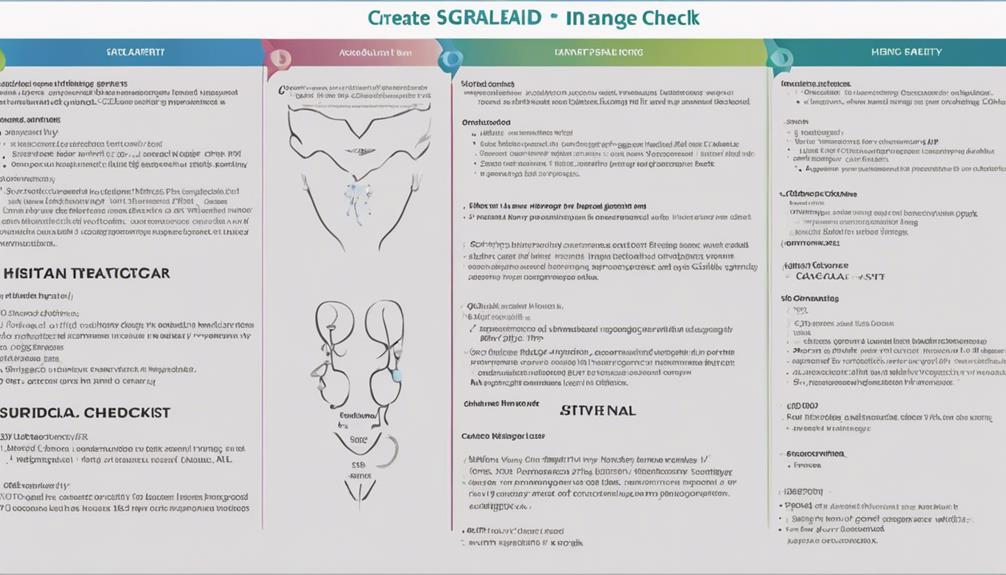Cochlear Implants
Essential Criteria for Cochlear Implants: A Step-by-Step Guide
With a systematic approach, discover the intricate steps and key factors that define suitable candidates for cochlear implants, transforming lives.

As we delve into the intricate maze of crucial criteria for cochlear implants, we reveal a systematic approach that emphasizes the intricate procedures required during the evaluation phase. Each requirement, from audiometric assessments to determining eligibility for surgery, is essential for the success of cochlear implant procedures.
But what exactly sets apart a suitable candidate from others? Join us as we dissect the key factors that shape the path towards enhanced hearing capabilities and improved quality of life for individuals considering cochlear implants.
Key Takeaways
- Audiological evaluation guides implant candidacy.
- Medical assessment ensures anatomical suitability.
- Psychological screening assesses emotional readiness.
- Post-implant care involves regular monitoring and rehabilitation.
Audiological Evaluation
During the audiologic evaluation process for cochlear implant candidacy, a pure-tone audiogram is utilized to assess the type and degree of hearing loss in potential candidates. This assessment is crucial in determining the suitability of cochlear implants for individuals experiencing severe to profound hearing loss. The audiogram provides valuable information about the specific frequencies and intensity levels where the candidate may have difficulty hearing. By analyzing the shape of the audiogram, audiologists can predict which sounds the cochlear implant recipient may perceive more effectively post-implantation.
Furthermore, comparing aided and unaided outcomes on the audiogram helps in evaluating the potential benefits of cochlear implantation for the candidate. Understanding the type and degree of hearing loss through the audiogram, along with reviewing past audiological records, aids in assessing the stability and progression of the candidate's hearing loss. This comprehensive audiologic evaluation process is essential in determining the candidacy and predicting the success of cochlear implantation for individuals seeking to improve their hearing abilities.
Medical Assessment

Following the comprehensive audiological evaluation to assess cochlear implant candidacy, the next crucial step is the medical assessment, which evaluates the individual's overall health, hearing history, ear condition, and cochlear anatomy prior to surgery. During this evaluation, radiologic testing is conducted to visualize the cochlear anatomy and ensure suitability for implantation. Detailed evaluations are essential to determine the eligibility of individuals for cochlear implantation based on specific criteria for successful outcomes.
The assessment includes examining the cochlea to identify any contraindications to surgery. Medical assessments for cochlear implants are typically performed under general anesthesia to ensure patient comfort and safety throughout the process. By thoroughly assessing the individual's medical history, cochlear anatomy, and overall health, healthcare professionals can make informed decisions regarding the suitability for cochlear implant surgery, thus maximizing the chances of a successful outcome for the patient.
Psychological Evaluation
A critical aspect of the cochlear implant candidacy process involves conducting psychological evaluations to assess emotional readiness, coping skills, and expectations related to the implantation journey. These evaluations delve into the candidate's mental health, motivation, and support systems to ensure they have realistic expectations and psychological resilience for the cochlear implant journey.
—
| Psychological Evaluation Criteria | Description | Importance |
|---|---|---|
| Emotional Readiness | Assesses candidate's emotional preparedness for the cochlear implant process, including dealing with potential challenges. | Crucial for successful adaptation. |
| Coping Skills | Evaluates candidate's ability to manage stress, uncertainties, and changes that may arise during the implantation journey. | Essential for navigating difficulties. |
| Expectations | Examines candidate's outlook on post-implantation outcomes and ensures they have realistic expectations about the process. | Helps in setting achievable goals. |
—
These assessments play a vital role in identifying any psychological barriers or challenges that may affect the candidate's journey towards successful cochlear implantation.
Surgical Candidacy

To be considered for cochlear implantation, individuals must receive a diagnosis of bilateral moderate-to-profound sensorineural hearing impairment. When determining surgical candidacy for cochlear implants, several essential criteria must be met:
- Limited benefit from traditional hearing aids: Patients should show minimal improvement in hearing with traditional aids to be eligible for cochlear implantation.
- Cognitive ability for auditory interpretation: The ability to interpret auditory cues is crucial for the successful use of cochlear implants.
- Evaluation of cochlear anatomy: Assessment of cochlear anatomy ensures that the cochlear lumen is suitable for implantation, optimizing the chances of successful outcomes.
- Absence of contraindications: Individuals mustn't have medical conditions that pose risks during surgery, as ensuring safety is paramount for implantation suitability.
Meeting these criteria is vital to determine the appropriateness of cochlear implant surgery and maximize the potential benefits for individuals with significant hearing impairment.
Post-Implant Care
Post-implant care for cochlear implants necessitates regular follow-up appointments with the audiologist to adjust the sound processor settings effectively. Monitoring changes in hearing performance and device functionality is crucial during this phase. Rehabilitation activities like auditory training and speech therapy play a vital role in optimizing the benefits of the cochlear implant. Patients should prioritize protecting their implant from water exposure and physical damage to maintain optimal performance levels.
Adhering to the recommended maintenance guidelines provided by the healthcare team is essential for ensuring the long-term success of the cochlear implant. These guidelines include proper cleaning techniques, battery replacement schedules, and handling precautions. Any concerns or issues related to the device should be promptly addressed with the audiologist to prevent potential complications.
Frequently Asked Questions
What Are the Guidelines for Recommending Cochlear Implantation?
When recommending cochlear implantation, we consider factors like:
- Degree of hearing impairment
- Limited benefit from hearing aids
- Cognitive ability for auditory interpretation
- Suitability of cochlear anatomy
It's crucial to assess contraindications to surgery thoroughly. These guidelines help determine if a candidate is suitable for cochlear implants and can lead to successful outcomes.
Conclusion
In conclusion, while the criteria for cochlear implants may seem stringent, the benefits far outweigh the challenges. It's ironic that a small device can make such a significant impact on someone's quality of life.
Through the collaboration of medical professionals and advancements in technology, the future looks promising for individuals with hearing impairments. Remember, sometimes the smallest things can make the biggest difference.
Jamie is one of the creative forces behind the words that resonate with our audience at Deaf Vibes. With a passion for storytelling and advocacy, Jamie delves into topics that matter deeply to the deaf and hard-of-hearing community. Jamie’s articles are crafted with empathy, insight, and a commitment to positive change, from exploring the latest advancements in hearing technologies to shedding light on the everyday challenges and victories of those within the community. Jamie believes in the power of shared stories to inspire action, foster understanding, and create a more inclusive world for everyone.
Cochlear Implants
How Much Does Cochlear Implants Cost: A Comprehensive Guide
Uncover the mysteries of cochlear implant costs and find out how this life-changing technology comes at a price that might surprise you.

Exploring the complex world of costs related to cochlear implants, one can’t help but wonder: what is the true cost of this life-changing technology?
As we navigate through the intricacies of pricing and financial considerations, a comprehensive guide awaits those seeking clarity on the expenses involved.
Understanding the nuances of factors that sway the cost, uncovering potential coverage from insurance providers, and discovering payment assistance avenues are just the tip of the iceberg in this complex realm of auditory restoration.
Key Takeaways
- Cochlear implant costs range from $50,000 to $100,000, influenced by location and insurance coverage.
- Medicare covers 80% of the implant cost, with patients responsible for the remaining 20%.
- Various payment options and financial assistance programs can help alleviate the financial burden.
- Consider all factors, negotiate costs, and explore assistance programs to manage cochlear implant expenses effectively.
Understanding Cochlear Implant Costs
When considering the cost of cochlear implants, it's essential to understand the various factors that contribute to the overall expenses involved. The total cost of cochlear implants, ranging from $50,000 to $100,000, covers the surgery, initial care, and ongoing maintenance. Insurance coverage, such as private insurance, Medicare, and Medicaid, plays a crucial role in reducing out-of-pocket costs for patients. Typically, patients are responsible for 10-20% of the surgery costs, in addition to deductibles, co-insurance, and co-pays, depending on their specific insurance plan.
It is important to note that costs can vary based on the location of the surgery center and the patient's insurance plan, impacting the overall expenses associated with cochlear implants. To better understand the financial aspects of cochlear implant surgery, patients should inquire with their insurance provider about coverage details, in-network providers, and potential out-of-pocket costs. By being informed about insurance coverage and associated costs, patients can make more educated decisions regarding their health and well-being.
Factors Influencing Implant Cost

Understanding the various factors that influence the cost of cochlear implants is essential for patients seeking clarity on the financial aspects of their surgery. When considering the cost of implants, several crucial factors come into play:
- Location Impact: The geographical location where the surgery takes place can significantly affect the overall cost of the cochlear implant procedure.
- Choice of Surgical Center: Opting for a specific surgical center or a surgeon who's in-network with your insurance provider can influence the final cost of the implant surgery.
- Insurance Coverage: The type of insurance coverage you have, whether it's private insurance, Medicare, or Medicaid, plays a vital role in determining the out-of-pocket expenses for cochlear implants.
- Financial Assistance Programs: Various assistance programs, such as grants or support from nonprofit organizations, can help alleviate some of the financial burdens associated with cochlear implant surgery.
Considering these factors can provide a clearer picture of the potential costs involved in pursuing a cochlear implant to restore hearing abilities.
Medicare Coverage for Implants
Medicare typically covers 80% of the cost of cochlear implants for eligible beneficiaries, with patients responsible for the remaining 20% of the Medicare-approved amount for the implant.
Medicare beneficiaries can explore Supplemental Medigap plans to help reduce out-of-pocket expenses significantly. It's important to note that Medicare Advantage plans may offer varying coverage for cochlear implants, impacting patient costs.
Understanding the financial aspects of cochlear implants coverage under Medicare can be crucial. Beneficiaries should familiarize themselves with Medigap options to mitigate patient costs effectively.
Payment Options and Assistance

Cost considerations are crucial when exploring payment options and assistance for cochlear implants. Here are some key points to consider:
- Insurance Coverage: Having insurance significantly reduces the financial burden associated with cochlear implants.
- Payment Options: Manufacturers often offer payment plans to help manage the upfront costs of the implants.
- Financial Assistance Programs: Non-profit organizations such as the Colorado Neurological Institute provide financial aid for individuals in need.
- Additional Costs: Patients should be aware of potential additional costs for follow-up care, maintenance, and replacement parts over time.
Understanding the various payment options, insurance benefits, and financial assistance programs available can help individuals navigate the costs associated with cochlear implants. It's essential to explore all avenues to ensure that financial constraints don't hinder access to this life-changing technology.
Budgeting for Cochlear Implants
Considering the financial implications of cochlear implant surgery is essential for effective budgeting and planning. When budgeting for cochlear implants, it's crucial to factor in all costs associated with the procedure, including the device, surgeon, anesthesia, and center fees. Self-pay patients should be aware that negotiating costs using Medicare pricing can be an option. Monthly premiums should also be included in the budget for the first year of care. Opting for surgery centers over hospitals can help lower overall expenses. Changing health insurance plans to reduce costs and considering high deductible plans for subsequent years are smart budgeting strategies. Below is a table summarizing key points to consider when budgeting for cochlear implants:
| Aspect | Consideration |
|---|---|
| Monthly Premiums | Include in the first-year budget for cochlear implants |
| Surgery Center Costs | Typically lower than hospital costs |
| Insurance Plans | Change to reduce costs; consider high deductible plans |
| Self-Pay Patients | Negotiate costs using Medicare pricing |
| All Associated Fees | Factor in device, surgeon, anesthesia, and center fees |
Frequently Asked Questions
Will Insurance Cover a Cochlear Implant?
Insurance coverage for cochlear implants varies but typically includes assistance from Medicare, private insurance plans, and Medicaid. This coverage often spans 80% of the costs, helping to alleviate financial burdens.
Out-of-pocket expenses like coinsurance, copays, and deductibles may still apply depending on the specific insurance plan.
For those without coverage, assistance programs are available to help manage the costs of cochlear implant surgery.
How Much Does It Cost to Get a Cochlear Implant With Medicare?
We've all wondered about the cost of cochlear implants with Medicare. Let's break it down.
Medicare generally covers 80% of the surgery cost, leaving beneficiaries responsible for the remaining 20%. Supplement plans can help with out-of-pocket expenses, but coverage under Medicare Advantage plans varies.
Private insurance, Medicaid, and Veterans Administration programs often assist with costs. Knowing these options can make navigating the financial aspect of cochlear implants easier.
How Much Does Bilateral Cochlear Implant Surgery Cost?
Bilateral cochlear implant surgery can cost between $100,000 to $200,000 for both ears. This total includes the surgical procedure, device expenses, and necessary follow-up care.
Insurance coverage can greatly reduce these costs, with Medicare typically covering 80% of the expenses for each ear.
Patients should explore bundled pricing options and financial aid programs to help manage the financial aspects of bilateral cochlear implant surgery.
What Is the Cost of Cochlear Implant Speech Processor?
The cost of a cochlear implant speech processor typically ranges from $7,000 to $10,000. Prices may vary based on the manufacturer, model, and features. Insurance coverage can help reduce out-of-pocket expenses. Patients should budget for potential future upgrades or replacements.
Manufacturers like Cochlear Americas, Med-El, and Advanced Bionics offer various options at different prices. It's essential to consider all factors when determining the overall cost of a cochlear implant system.
Conclusion
In the symphony of life, cochlear implants serve as the conductor, orchestrating a harmonious blend of sound and silence. Just as a skilled maestro guides the music with precision and grace, these remarkable devices bring clarity and melody to those who embrace them.
Embrace the journey of hearing restoration with an open heart and a song in your soul, for the cost of cochlear implants is a small price to pay for the symphony of sounds that awaits.
Jamie is one of the creative forces behind the words that resonate with our audience at Deaf Vibes. With a passion for storytelling and advocacy, Jamie delves into topics that matter deeply to the deaf and hard-of-hearing community. Jamie’s articles are crafted with empathy, insight, and a commitment to positive change, from exploring the latest advancements in hearing technologies to shedding light on the everyday challenges and victories of those within the community. Jamie believes in the power of shared stories to inspire action, foster understanding, and create a more inclusive world for everyone.
Cochlear Implants
What Are Hybrid Cochlear Implants and How Do They Work?
Wondering how hybrid cochlear implants seamlessly blend hearing aid technology with traditional implants? Dive into the innovative world of auditory solutions.

During our exploration of hybrid cochlear implants, we encounter a fascinating blend of technology that merges the advantages of hearing aids and traditional cochlear implants.
The intricate workings of these devices offer a glimpse into a realm where sound is transformed and harnessed in a unique manner, paving the way for a more comprehensive auditory solution.
Let's unravel the mechanisms that underpin hybrid cochlear implants and shed light on their innovative approach to addressing hearing loss.
Key Takeaways
- Hybrid Cochlear Implants combine hearing aid amplification and Cochlear Implant stimulation.
- They enhance speech clarity, music appreciation, and overall sound perception.
- Electric stimulation bypasses damaged hair cells to improve high-frequency hearing.
- Users benefit from personalized, comprehensive solutions for severe to profound hearing loss.
Hybrid Cochlear Implants Overview
Hybrid cochlear implants revolutionize treatment for hearing loss by seamlessly integrating hearing aid and cochlear implant technologies. These implants are designed to cater to individuals with severe to profound high-frequency hearing loss while retaining some low-frequency hearing. By combining the strengths of both devices, hybrid cochlear implants offer enhanced speech understanding and improved music appreciation, addressing the diverse auditory needs of users.
One key advantage of hybrid cochlear implants is their ability to transmit low-frequency sounds to the hearing aid component and high-frequency sounds to the cochlear implant. This feature optimizes auditory performance in various environments, ensuring that individuals can effectively communicate and enjoy music more fully. Leveraging residual low-frequency hearing, these implants enrich the overall auditory experience, leading to a better quality of life for those with significant hearing challenges.
In essence, hybrid cochlear implants represent a significant advancement in the field of hearing loss treatment, providing a comprehensive solution for individuals with complex auditory needs.
Components of Hybrid CIs

The components of hybrid cochlear implants include sophisticated technology that seamlessly integrates hearing aid and cochlear implant functionalities to address mixed-frequency hearing loss. These implants are designed to optimize speech clarity and music enjoyment by transmitting low-frequency sounds to a hearing aid for amplification and high-frequency sounds to a cochlear implant for electrical stimulation. The external processor of a hybrid CI separates sounds into low and high frequencies to enhance overall sound quality. Surgical techniques for hybrid cochlear implants focus on preserving residual low-frequency hearing during the implantation process.
| Components | Description | Purpose |
|---|---|---|
| Hearing Aid | Amplifies low-frequency sounds | Enhances residual low-frequency hearing |
| Cochlear Implant | Provides electrical stimulation for high-frequency sounds | Stimulates auditory nerves for speech clarity |
| External Processor | Separates sounds into low and high frequencies | Optimizes sound quality for improved speech perception and music enjoyment |
Electric Stimulation Mechanism
Utilizing electric stimulation, hybrid cochlear implants efficiently transmit high-frequency sounds directly to the hearing nerve, bypassing damaged hair cells in the cochlea for enhanced speech clarity and sound perception. This innovative electric stimulation mechanism plays a crucial role in improving speech understanding and music appreciation for individuals with high-frequency hearing loss.
Here are some key points to consider about how electric stimulation works in hybrid cochlear implants:
- High-frequency sounds are converted into electrical signals to stimulate the auditory nerve.
- The mechanism bypasses damaged hair cells within the cochlea.
- Direct delivery of sound signals to the nerve enhances speech clarity.
- Cochlear implant technology enables individuals to benefit from this process.
- Users experience improved music appreciation due to the enhanced transmission of high-frequency sounds.
Acoustic Amplification Function

Combining acoustic amplification for low-frequency sounds with electrical stimulation for high-frequency sounds, hybrid cochlear implants offer a comprehensive solution for individuals with specific hearing challenges. The acoustic amplification function of hybrid cochlear implants leverages natural low-frequency hearing by using acoustic components in the hearing aid to amplify these sounds.
Meanwhile, the high-frequency sounds are converted into electrical signals by the cochlear implant, which then directly stimulates the hearing nerve through the Hybrid electrode. During cochlear implantation, preserving inner hair cells and the delicate structures within the cochlea, like the round window and bony work, is crucial for optimal functioning. Opening the cochlea to place the implant requires precision to maintain the integrity of these structures.
User Experience and Benefits
Incorporating acoustic amplification for low-frequency sounds and electrical stimulation for high-frequency sounds, users of Hybrid Cochlear Implants benefit from an enhanced auditory experience that improves speech comprehension in challenging environments.
Here are some key benefits reported by individuals with Hybrid Cochlear Implants:
- Improved speech understanding in noisy environments.
- Enhanced music appreciation and recognition.
- Personalized hearing solution tailored to specific needs.
- Comprehensive approach to hearing loss by combining hearing aid and implant technologies.
- Overall enhancement in quality of life and communication abilities.
These benefits highlight the significant impact Hybrid Cochlear Implants can have on an individual's daily life, offering a unique and effective solution for those facing hearing challenges.
Frequently Asked Questions
What Is the Difference Between a Cochlear Implant and a Hybrid Cochlear Implant?
The key difference between a cochlear implant and a hybrid cochlear implant lies in their approach to hearing loss.
While a traditional cochlear implant is designed for profound hearing loss across all frequencies, a hybrid implant caters to individuals with some remaining low-frequency hearing.
This distinction enables hybrid implants to provide a more nuanced auditory experience by utilizing both residual low-frequency hearing and electrical stimulation for high-frequency sounds.
What Are the Criteria for Cochlear Hybrid?
To be eligible for Cochlear Hybrid implants, individuals must have low-frequency hearing pre-surgery and severe high-frequency hearing loss. Suitable candidates typically exhibit ski-slope hearing loss or normal to moderate low-frequency hearing loss. Those who struggle with missing high-frequency sounds and seek improved understanding of spoken words may qualify.
People with a mix of absent high-frequency sounds and preserved low-frequency natural hearing often benefit. Cochlear Hybrid aims to enhance sound richness, aiding in emotion detection in speech.
What Is the 60 60 Rule for Cochlear Implants?
We follow the 60 60 Rule for cochlear implants to preserve low-frequency hearing. Achieving 60 dB SPL at 60 Hz during surgery helps maintain this crucial aspect post-implantation.
This preservation can improve speech understanding and music appreciation. Surgeons take care during electrode insertion to minimize trauma and meet the rule's requirements.
Adhering to this guideline enhances success and satisfaction for cochlear implant recipients.
What Are the Two Types of Cochlear Implant?
Sure thing!
Well, there are two types of cochlear implants: traditional cochlear implants and hybrid cochlear implants.
Traditional ones send electrical signals throughout the entire cochlea, while hybrids, like the one we're discussing, aim to preserve some low-frequency hearing.
These hybrids are a game-changer for those with mixed-frequency hearing loss, combining the best of hearing aid and cochlear implant technologies for a tailored solution to their unique needs.
Conclusion
In conclusion, hybrid cochlear implants offer a unique solution for individuals with mixed-frequency hearing loss. Studies have shown that hybrid cochlear implants can significantly improve speech understanding in noisy environments, with up to 80% of users reporting improved speech recognition.
This innovative technology combines the benefits of hearing aids and traditional cochlear implants, providing a richer auditory experience for those with severe to profound high-frequency hearing loss.
Jamie is one of the creative forces behind the words that resonate with our audience at Deaf Vibes. With a passion for storytelling and advocacy, Jamie delves into topics that matter deeply to the deaf and hard-of-hearing community. Jamie’s articles are crafted with empathy, insight, and a commitment to positive change, from exploring the latest advancements in hearing technologies to shedding light on the everyday challenges and victories of those within the community. Jamie believes in the power of shared stories to inspire action, foster understanding, and create a more inclusive world for everyone.
Cochlear Implants
How Much Do Cochlear Implants Cost in the US: A Comprehensive Guide
Intrigued by the costs of cochlear implants in the US? Discover the surprising figures and crucial factors that impact accessibility and affordability.

As we delve into the intricate realm of cochlear implant costs in the United States, we find that financial considerations play a crucial role in accessing this technology.
The figures may surprise you, prompting a deeper exploration of the various components that contribute to the overall expenses associated with cochlear implants.
Understanding the nuances of insurance coverage, out-of-pocket expenses, and available assistance programs can shed light on the affordability and accessibility of this life-changing auditory solution.
Let's uncover the intricacies together.
Key Takeaways
- Cochlear implants in the US range from $50,000 to $100,000.
- Medicare covers 80% of cochlear implant costs.
- Patients may need to pay coinsurance, copays, or deductibles.
- Assistance programs are available for uninsured individuals.
Types of Cochlear Implants
When considering cochlear implants, individuals have the option to choose from different types offered by FDA-approved manufacturers in the US. Cochlear Americas, Med-El, and Advanced Bionics are the three main manufacturers providing unique cochlear implant technology.
Cochlear Americas specializes in the Nucleus System, known for its advanced signal processing capabilities. Med-El distinguishes itself with robust electrode arrays that enhance sound perception. On the other hand, Advanced Bionics offers the HiRes Ultra 3D Cochlear Implant System, which is renowned for its high-resolution sound quality.
Each manufacturer has its strengths and innovations, allowing patients to select the cochlear implant that best suits their individual requirements. The Nucleus System by Cochlear Americas, Med-El's electrode arrays and signal processing, and Advanced Bionics' HiRes Ultra 3D system provide diverse options for individuals seeking improved hearing through cochlear implant technology. By understanding the unique features of each manufacturer's offerings, individuals can make informed decisions tailored to their specific needs.
Average Cost and Factors

Moving on to the discussion of the average cost and factors associated with cochlear implants in the US, it is important to consider various financial aspects that can impact the overall expenses for individuals seeking this technology. The average total cost of cochlear implants in the US ranges from $50,000 to $100,000, with variations based on factors such as location, insurance coverage, and in-network providers. Patients may have financial responsibilities like coinsurance, copays, and deductibles, depending on their insurance plans. Assistance programs exist for those without insurance coverage to aid in covering the costs of cochlear implants. Understanding the details of insurance coverage is crucial for managing the financial aspects of cochlear implant surgery.
| Factors | Details |
|---|---|
| Insurance Coverage | Varied based on individual plans and may cover a portion of the cochlear implant costs. |
| Assistance Programs | Available for individuals without insurance coverage to help alleviate the financial burden. |
| In-Network Providers | Choosing providers within the insurance network can lead to lower out-of-pocket expenses for patients. |
| Deductible | Amount individuals must pay out of pocket before insurance coverage begins to contribute. |
| Financial Aspects | Understanding and planning for potential costs is essential in managing the expenses of cochlear implants. |
Medicare Coverage Details
Understanding how Medicare covers cochlear implants is crucial for individuals considering this form of hearing assistance. When it comes to Medicare coverage for cochlear implants, here are some key details to keep in mind:
- Medicare typically covers 80% of the cost of cochlear implants for eligible candidates.
- Beneficiaries are responsible for the remaining 20% of the cost under Medicare coverage.
- Medicare Supplement plans and Medicare Advantage plans can impact coverage details for cochlear implants.
- Over 90% of private insurance, Medicaid, and Veterans Administration help cover cochlear implant costs.
Having a clear understanding of how Medicare works in relation to cochlear implants is essential for managing the costs associated with this type of hearing assistance. It's important to explore all available options, including private insurance, Medicaid, and additional Medicare plans, to ensure comprehensive coverage for cochlear implants.
Payment Options and Considerations

Exploring various payment options and considerations for cochlear implants is essential for managing the substantial costs associated with this form of hearing assistance in the US.
The cost of a hearing implant can range from $50,000 to $100,000 per ear, making it crucial to understand the available financial assistance avenues. Health insurance, including private insurance, Medicare, and Medicaid, commonly offer coverage for cochlear implant expenses, although patients may still face coinsurance, copays, and deductibles based on their specific insurance plan.
For those without insurance coverage, assistance programs and financial aid options exist to help offset the high cost of cochlear implants. By thoroughly examining insurance coverage details and researching payment options, individuals can make informed decisions to alleviate the financial burden associated with acquiring a cochlear implant.
Being proactive in exploring these avenues can ensure that individuals in need of this technology can access it without undue financial strain.
Sources and References
Based on extensive research and expert opinions, numerous reliable sources and references provide valuable information on the cost, coverage options, and financial assistance programs related to cochlear implants in the United States.
- Health insurance plans, including private insurance and Medicare Advantage, often cover a significant portion of the costs associated with cochlear implants.
- Eligibility criteria for insurance coverage vary, with Medicare typically covering 80% of the cost for eligible candidates, leaving the individual responsible for the remaining 20%.
- Surgical fees for cochlear implantation can range from $50,000 to $100,000, depending on factors such as location, choice of surgical center, and insurance coverage.
- Various assistance programs exist to help individuals without insurance coverage offset the high costs of cochlear implants, ensuring that more people have access to this life-changing assistive hearing device.
Frequently Asked Questions
How Much Does It Cost to Get a Cochlear Implant With Medicare?
When getting a cochlear implant with Medicare, the cost usually involves Medicare covering 80% of the expenses. As beneficiaries, we're responsible for the remaining 20% of the cost.
To potentially reduce out-of-pocket expenses, considering supplemental Medigap policies is advisable. Additionally, Medicare Advantage plans offer various coverage options for cochlear implant costs.
Understanding these details is essential for individuals contemplating cochlear implant surgery.
Will Insurance Cover a Cochlear Implant?
Insurance coverage for cochlear implants varies based on the type of plan. Medicare typically covers 80% of costs for eligible candidates in the US, while private insurance, Medicaid, and Veterans Administration also provide coverage.
It's important to check with your insurance provider to understand specific benefits and costs associated with the surgery. Payment assistance programs and non-profit organizations can help individuals without insurance coverage for cochlear implants.
What Is the Rate of Cochlear Implant?
The rate of cochlear implantation varies depending on several factors, including the medical facility, surgeon expertise, and geographical location.
Typically, the procedure involves both surgical and post-operative care costs. These expenses encompass the surgical implantation of the device, anesthesia, hospital fees, follow-up appointments, and rehabilitation services.
Understanding these components can provide a clearer picture of the overall rate associated with cochlear implant surgery.
Does Obama Care Cover Cochlear Implants?
Absolutely!
Obamacare, or the Affordable Care Act, may cover cochlear implants. While not explicitly listed, the ACA mandates coverage for essential health services, potentially including cochlear implants. Insurance plans from the Health Insurance Marketplace under Obamacare might cover cochlear implants, depending on specific plan details and individual circumstances.
Exploring coverage options under Obamacare, including plan specifics and eligibility criteria, can help individuals seeking cochlear implants navigate potential insurance coverage.
Conclusion
In conclusion, the cost of cochlear implants in the US can vary greatly, with an average range of $50,000 to $100,000.
It's interesting to note that Medicare typically covers 80% of the costs for eligible candidates, leaving only 20% for the patient to cover.
Despite the high costs, there are payment options and assistance programs available to help make this life-changing technology more accessible to those in need.
Jamie is one of the creative forces behind the words that resonate with our audience at Deaf Vibes. With a passion for storytelling and advocacy, Jamie delves into topics that matter deeply to the deaf and hard-of-hearing community. Jamie’s articles are crafted with empathy, insight, and a commitment to positive change, from exploring the latest advancements in hearing technologies to shedding light on the everyday challenges and victories of those within the community. Jamie believes in the power of shared stories to inspire action, foster understanding, and create a more inclusive world for everyone.
-

 Navigating the VA System4 weeks ago
Navigating the VA System4 weeks agoVA Hearing Loss Rating Chart: Understanding Disability Compensation
-

 Therapies and Interventions3 months ago
Therapies and Interventions3 months ago10 Auditory Processing Goals for Effective Speech Therapy
-

 Living with Hearing Loss2 months ago
Living with Hearing Loss2 months ago10 Deaf-Friendly Dating Sites to Find Your Perfect Match
-

 Sign Language3 months ago
Sign Language3 months agoSign Language Emoji Translator: How to Communicate With Gestures
-

 Tinnitus1 month ago
Tinnitus1 month agoVA's Rating System for Tinnitus and Hearing Loss Explained
-

 Navigating the VA System3 weeks ago
Navigating the VA System3 weeks agoUnderstanding Bilateral Hearing Loss VA Rating Criteria
-

 Vetted1 month ago
Vetted1 month ago15 Best Oticon Hearing Aids to Improve Your Hearing in 2024
-

 Living with Hearing Loss2 months ago
Living with Hearing Loss2 months agoAn Introduction to Deaf Culture: Understanding the Basics



















